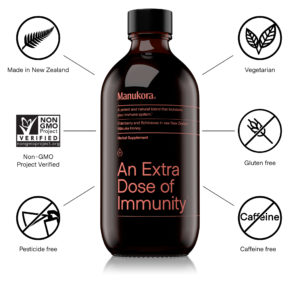There is good news in the world of bees, and that news comes from New Zealand: Honey bee populations in the country have been growing steadily for the last century. Progress like this is all the more critical as global populations of bees and other pollinators move in the opposite direction. This achievement speaks to a deeply held commitment to the care, revitalization and sustainability of the natural world, a dedication to working with nature in every endeavor. The team at Manukora is at the forefront of that movement, as are their bees.
The Manukora philosophy of sustainable and ethical honey production was inspired by Bryce Hooton, a pioneer beekeeper from New Zealand's North Island. When Manukora CEO Mike Bell met Bryce in 2015, Mike was struck by the attentiveness with which Bryce raised his bees. That level of care was not only a huge asset. It was also an offshoot of a unique aspect of the master beekeeper's life: Bryce Hooton is completely blind.
In a 2015 interview, Bryce describes how he adapted to working with the bees without sight: "I actually go by sound," he says. "The sound today — they're actually happy. The sun's out, they're actually getting on to something, the barberry's in flower."
The interview as a whole is a fascinating exchange between one man who is entirely at ease in his surroundings and one amazed (and sighted) reporter who appears much less so. "Another thing you can do when you've got a little bit of time," Bryce continues, "you can actually give your little bees a pat." He reaches down and lightly strokes the mass of fuzzy bees with his relaxed, outstretched hand. The reporter pauses, takes a deep breath and pats the bees. And it's fine.
Bryce knows bees.
Beekeeping magic in the Golden Triangle
Bryce and Mike worked together tending hives in New Zealand's Golden Triangle, an expanse that stretches across the tip of the North Island. The secluded landscape is populated with native Mānuka trees, producing ideal conditions for some of the world's best honey. Mānuka honey is dark in color, has a unique taste and texture and is remarkably rich in flavonoids — plant compounds packed with antioxidants. The potential health benefits of flavonoids include boosted immune system, support for healthy aging and increased energy.
Much of the Golden Triangle landscape is remote or sparsely populated, and the team at Manukora works with local landowners to ensure that bees aren't exposed to sprays or chemical residues. This type of outreach could have exponential benefits, as the conditions that beekeepers seek out also protect native wildlife and the people who share the land with them. As part of their Non-GMO Project Verification, Manukora hives must be at least 4 miles away from any land planted with genetically modified crops, keeping GMO pollen out of the beehives and the honey harvested from it.
What makes Manukora special
Nestled amongst beekeepers striving for the best honey in the world, Manukora still stands alone. Their reputation rests in part on the Trust Code, a QR unique to each jar that tells the end user all about the honey they are about to consume. The Trust Code confirms the product's authenticity and potency, backed by certification guidelines upheld by the New Zealand government's Ministry of Primary Industries (MPI). Shoppers can use the Trust Code to trace their jar of Manukora honey back to the exact hive from which it was harvested.
In addition to Non-GMO Project verification, Manukora honey is also certified free of glyphosate residue. Glyphosate is the active ingredient in the world's most popular herbicide, as well as the subject of controversy and litigation as some longtime users of glyphosate products become seriously ill. Glyphosate can also compromise the health of bees who are exposed to it.
The guiding principle of Manukora's approach and operations is a steadfast commitment to learning from nature. It's the basis of their ambitious environmental programs. The team at Manukora is keenly aware of the challenges facing the stunning and unique ecosystems of New Zealand and continually tries to do better and learn more from arguably the greatest, most innovative teacher there is: the earth that holds us. You can check in on what the team is up to here.

More than just honey: An Extra Dose of Immunity
Many of us are thinking about our health these days, wondering how best to support it under the challenges of daily life. Manukora's "An Extra Dose of Immunity" offers an easy and practical choice, delivering the antioxidant boost a tired body needs. Immune-boosting botanicals Elderberry and Echinacea join the highest quality, raw Mānuka honey. As a Manukora product, ingredients follow the strictest standards for responsible ecological sourcing, independent testing and Non-GMO Project verification.
The Manukora name means you don't have to choose between caring for yourself and caring for the planet. From the remote regions of New Zealand, Manukora delivers powerful Mānuka honey while stewarding the land and shepherding its tiniest wildlife.
Nature truly is awesome.
